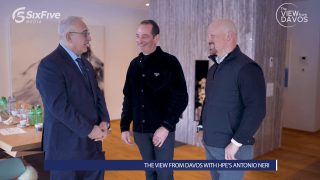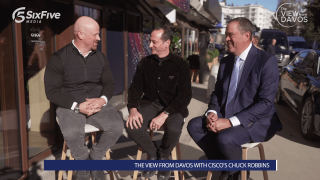You could be carrying an AI agent in your pocket. 📲
Olivier Blanchard, Research Director & Practice Lead, AI, Futurum, and Anshel Sag, Principal Analyst, Moor Insights & Strategy, are at the Samsung Galaxy Unpacked event where they’re joined by Samsung Electronics America’s Brad Haczynski, SVP and General Manager for B2B Mobile eXperience. They share a conversation on Samsung’s reveal of the, Galaxy S25 series, packed with powerful AI capabilities for this episode of Six Five On The Road.
Tune in for details on:
- Brad Haczynski’s insights into the Galaxy S25
- Samsung’s AI strategy to empower businesses & professional with productivity and efficiency
- How Samsung’s newly created AI agent will influence businesses
- Approaches adopted by Samsung to ensure privacy and create a secure environment for businesses utilizing mobile technology, with a special focus on AI implementations
Learn more at Samsung.
Watch the video below at Six Five at Galaxy Unpacked, and be sure to subscribe to our YouTube channel, so you never miss an episode.
Or listen to the audio here:
Disclaimer: Six Five On The Road is for information and entertainment purposes only. Over the course of this webcast, we may talk about companies that are publicly traded, and we may even reference that fact and their equity share price, but please do not take anything that we say as a recommendation about what you should do with your investment dollars. We are not investment advisors, and we ask that you do not treat us as such.
Transcript:
Olivier Blanchard: Hi, Six Five is On the Road at Galaxy Unpacked in San Jose. I’m Olivier Blanchard with Anshel Sag, and we’re going to dig a little bit deeper into the announcements that were made today by Samsung.
Anshel Sag: We are joined today by Brad Haczynski. Welcome to Six Five. I know it’s been a while, but we’re happy to have you. And can you maybe tell us a little bit about your role at Samsung?
Brad Haczynski: Sure. So first of all, thank you for having me. It’s great to be here again. Always enjoy our conversations. So my role at Samsung is I’m responsible for our mobile B2B business in the United States. That means full revenue responsibility for growing the business. It’s across the entire portfolio from phones, tablets, watches, buds, rings, all the way to software and services and our incredible Knox platform. Our team is really responsible for engaging with customers, having a deeper understanding of what their requirements are for businesses, in particular with our mobile products, and then ultimately funneling that back to Suwon in Korea. So a lot of what we’ll talk about today is sort of what we’ve learned since we’ve launched technology such as Galaxy AI, and then how we quickly pivot and give that voice to the customer back so that we can make changes within our product groups at R&D to serve our customers best and continue the evolution of how we work with them.
Olivier Blanchard: So lots of announcements today. It’d be great if you could just run us through some of the main ones, the most important ones, and especially with the Galaxy S25 announcements. And it would be great also if you could give us a little bit of context on how moving from just the consumer market also how those are going to help business people and the enterprise and the commercial sector.
Brad Haczynski: Yeah. So today we launched, as you know, we do typically two launches a year. In the summer we launch our foldable series, and here we launched our exquisite S-series flagship devices, the S25 family. And what we really talked about today is really the evolution of Galaxy AI and the capabilities and what we’ve heard from customers across the world. So we’ve seen a big uptake in really how consumers and businesses are using the products. So we talk a lot about really making it a more personal native experience. So there was a lot of talk today about the One UI 7, which is more of a native agent capability. There’s a lot of incremental improvements at a device level where we talked about some of the new capabilities such as the camera, the wide lens camera capabilities, new power dissipation capabilities.
So really just it’s really improving upon that experience, but then working even more closely with a company like Google on how do we really define what they’re doing with their Gemini capabilities with what we’re doing with Galaxy AI and how we’re expanding upon that. And when it comes to businesses, we’re going to have a lot more of a discussion here. We can get into some of the specifics of what we learned. But it’s really about how do businesses take advantage of the AI capabilities on a device, what kind of outcomes can they create, and in different vertical industries, depending whether it’s a frontline worker or it’s someone in a backend distribution center. But also improvements. Today, we talked about security, the personal device engine. And then there’s a lot of concerns with AI around privacy and how can we ensure the users of these devices that their information is protected. Of course, the Knox hardware security platform, Knox Vault, is at the center of everything that we do at Samsung. So really it was a wonderful event and lots of evolution, I’d say, and more to come in the future.
Anshel Sag: And we’ve obviously talked a lot about AI, but I’d love to know about how you guys are helping your customers deploy AI to their employees and what that journey looks like.
Brad Haczynski: Yeah, so we’ve learned a lot. I will say last year when we launched Galaxy AI at the Unpacked event right here in San Jose with the S24 Series family, there were a multitude of questions that came from customers. How do I set it up in an enterprise environment? What is on device? What is not on device? So there’s a lot of things, a lot of questions that we didn’t have our answers to. But as we continue to explore, I mean we’ve learned quite a few things in the last year. The first is how the business use cases really work. So we’re seeing, we were building out throughout 2024 many use cases for different personas in different verticals. Some of those use cases scale horizontally. For instance, a frontline worker in a retail store might be the same as a frontline worker in a manufacturing plant, et cetera. How would they utilize the capabilities of the device, whether it’s increasing productivity or in a case of interacting with customers?
The second thing we’ve learned is that we’ve had over one million daily users on the communications capabilities of Galaxy AI. So every day, over a million people around the world are using the functions, whether it’s Live Translate or Note Assist, et cetera. And we’ve also seen that in the last year, we did a survey in July of 2024 that basically shows that effectively we’ve almost doubled the usage of mobile users who are now taking advantage of using AI on a mobile device. So it was about 16% and it’s gone up to 27% and continues to grow. And some of the feedback is when you ask those folks, 1.5x increase in productivity and a feeling of about 2x increase in creativity. So there’s a lot to unpack here. And again, it’s really about how can we take these capabilities, drive them into businesses, and then of course you have SMBs. The small medium business customers maybe require different things or have different concerns than large enterprises. So we really have to service that whole entire ecosystem of customers.
Olivier Blanchard: So speaking of AI, agentic AI is kind of the big topic for 2025. And you’ve made a decision, or Samsung’s made a decision to create its own agents. And I was wondering if you could talk a little bit about the thinking behind that, and also again looking at it from the perspective of consumers versus commercial applications and SMBs and the enterprise, how that plays across the entire ecosystem.
Brad Haczynski: Well, one is, again, the partnership we have with Google is really about driving Android as the predominant mobile experience in the world. And with generative AI and AI capabilities becoming fast and furious, it’s still a very nascent technology. So we would even have customers asking, well, you got Copilot over here and Gemini over here and Galaxy over here. So really it’s about that multimodal approach to build a native AI agent that’s sort of sitting at the phone level. One, it’s got the connectivity to Knox Vault. So when you talk about security, et cetera, you have security. But also the ability to have multiple applications really working seamlessly together. And it’s really about creating a more human-like AI experience. Because as you see, people want to move from this transactional calling of AI, whether it’s with a ChatGPT or even on a mobile device, they want it to be more like a personal assistant, a true personal assistant, that is knowledgeable, that can work across the different applications.
And so what we’re seeing is, again, for businesses, they think, wow, this is really cool, I could really utilize this. But that’s where the evolution of what we need to do to work with our customers around how do we ensure that security and productivity and really the security of those applications in a trusted environment for them to be able to truly take advantage of that agent. But it’s really about being first and most, and I call it, it’s my own words, it’s really being native. It’s about being a native AI mobile device versus a mobile device that has AI agents sort of just plopped on top as an application.
Olivier Blanchard: Makes sense.
Anshel Sag: Great. And you did talk a lot about this a little bit, but businesses have lots of concerns when it comes to security and privacy. And how are you guys helping to address those around Knox and then all the other components that you have with security?
Brad Haczynski: No, that’s a great question. Well, first of all, it’s incredible that in the last year, we’ve had Galaxy AI deployed on over 200 million Samsung devices. It’s quite a large number. So we’re seeing really the saturation into the marketplace across, again, the entire product portfolio. We’ve had active engagements. I talked a little bit earlier about how we’ve learned a lot through conversations. So customers know, especially when it comes to security and compliance, that Samsung really is one of the best in breed. As a matter of fact, the US government trusts us quite well because there’s a lot of our very public tactical edition products, et cetera, that have extra security requirements that are being brought into the battlefield with some of our soldiers and special operations. But when you get into these regulated industries, this is where the beauty of Knox comes in. Because when people say Knox, when we say Knox today at Unpacked, we’re really talking about the underpinning of the hardware security of the platform, which is a separate security chip.
So your biometrics, your passwords, your most sacred things are going to kind of be cordoned off into a separate enclave so that you can’t get any root of trust attacks, et cetera. So that’s the base. However, what we learned last year was, for instance, in some of the more regulated environments, there was questions around, well, I can’t have anything going to the cloud. Therefore, Samsung, how can you assure me that I… If I have to set this device to have the AI processing on device only, you have to help me set that through policy. So one of the things we did last year is we created a, it’s in the Knox, it’s called the Knox Services Plugin, which basically you can take an MDM such as Intune or MobileIron or we have our own Knox Manage, and you can give access to create policy to make sure that you can go in a corporate liable environment to ensure that the on-device toggle switch is always on. Right? You don’t want your employees doing that. You want to be able to control that.
Well, we’ve expanded upon that now. So what we also launched this year, actually today as part of the S25 launch, is now we’re making it so that it’s not just about toggling what’s on device versus off device, we can actually go individual applications. So now we’re giving that next level of control to the Knox Services Plugin, where now you can say, okay, I’m going to turn on Live Translate, I’m going to turn off Note Assist, I’m going to turn off this, so now you can go through the entire and give that more robust capabilities, and we’re continuing to build upon that. The other one that was another big challenge for us to solve is in some enterprise environments, they actually don’t allow employees to have a personal email address. So to activate Galaxy AI, you either have to have a Google account or a Samsung account.
So we actually had CIOs and IT decision makers come to us and say, “I’m not allowed to have that. By the way, if something happens and my employee loses a password, I have no way to reconcile that.” So launching later this year, we announced it today, but launching later this year, we’ll have the capability for enterprises to create a Samsung business user account, and you can tie that to their corporate email and identity, and then they can then have access to Galaxy AI in a much more controlled fashion, again, allowing IT decision makers to do what they do best. So those are just a couple of examples of we’ve pivoted that quickly in the last 12 months by getting the feedback from customers and, again, funneling it upstream. And we have one of the world’s most prestigious R&D departments, and they can move very quickly on implementing new capabilities as we go across to launching new devices.
Olivier Blanchard: Yeah. The ways that you are prioritizing security and data security on these devices for the whole ecosystem is really solid. That’s one of the things that I took out of today’s briefings and announcements. The AI stuff and the camera things, all these enhancements are super solid, but your emphasis on privacy was surprising, as good as it is.
Brad Haczynski: Yeah, no, and again, it’s the privacy of the user data, but also the security of where’s the data going? And we have full encryption standards. And as a matter of fact, we have some new capabilities for even for Quantum-
Olivier Blanchard: In a post-Quantum.
Brad Haczynski: Yeah, post-Quantum. So having just the absolute lockdown security capabilities that really keep out the threats that enterprise is worried about.
Anshel Sag: And I was going to say, I really like the granularity that you have too. It’s not super coarse. You can go by application. I think that’s super nice for enterprises that have different needs. So I think it’s good that you’re able to adjust to the enterprise needs.
Brad Haczynski: And that’s effectively what we’re trying to do. I mean, we really pride ourselves on being customer first. This is why these discussions are important because it’s really about giving them the tools and the capabilities to make their lives easier, and for them to have peace of mind that any device they’ve put in their environment, they’ll be able to serve their customers, which are their employees, but at the same time making sure they’re compliant with all the company protocols around compliance and security.
Anshel Sag: So Samsung has been growing quite a bit. And are there any new verticals or customers that you have that you might want to talk about?
Brad Haczynski: Yeah, so I mean we focus on verticals, but in one key particular, we had really big win in late 2024 with a large, very large retail sports company. And what they did is they took actually the Fold6 and deployed it to all of their store managers, and they generated a lot of excitement. But why did they choose the Fold6? The first thing we saw was they had the ability to, what I call device consolidation. They took the tablet and mobile phone and said, I have now one device for my store managers to carry. The second thing is they got store managers to come out from the back of the store into the front of the store, interacting with customers and interacting with their employees, what they call teammates. I think most importantly though is they are actively using the Galaxy AI features and Knox Security to make sure that they have the security capabilities on separating enterprise applications from personal.
But they’re using Live Translate with customers who come into the store who are not native speakers of English. And they’ve gotten a wonderful, it’s been a wonderful experience. They talked a lot about how incredible that capability is. And then as we move forward into the future, one of the things that we talked about today was the voice call recording capability, which I didn’t mention in my earlier answer, which is now if you have a customer on the phone, you can actually record that conversation through their permission, get a transcript and a summary of that, and then send out. So they’re seeing massive gains in productivity and really utilizing the AI on device in ways that are changing the customer experience.
Olivier Blanchard: Well, that’s all the time we have today, unfortunately. We’re going to have to have you come back on in a few months and talk about what’s next. But for the time being, thanks a lot for spending time with us. And for us, thanks for tuning into Six Five On the Road here at Galaxy Unpacked. Hit that subscribe button, follow us on socials, and also follow us and watch all of the other videos on SixFiveMedia.com. On behalf of Anshel and myself, have a great day.























































































